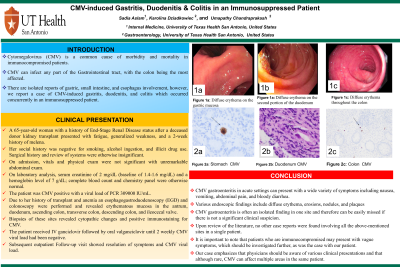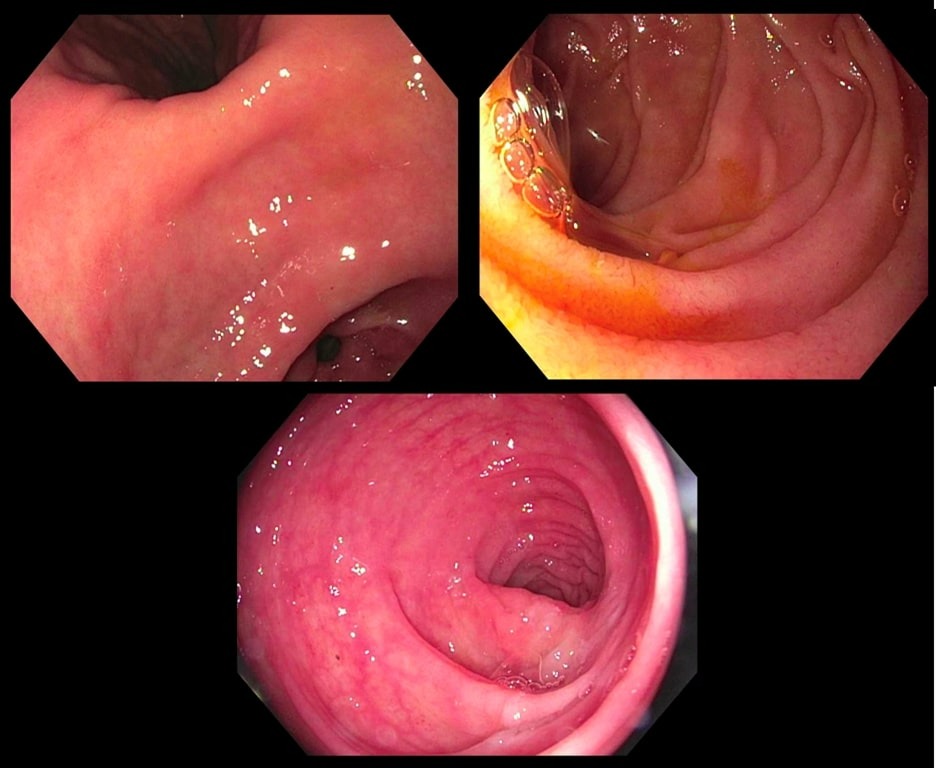Back


Poster Session C - Monday Afternoon
Category: General Endoscopy
C0296 - CMV-Induced Gastritis, Duodenitis and Colitis in an Immunosuppressed Patient
Monday, October 24, 2022
3:00 PM – 5:00 PM ET
Location: Crown Ballroom

Has Audio

Sadia Aslam, MD
University of Texas Health Science Center
San Antonio, TX
Presenting Author(s)
Sadia Aslam, MD1, Karolina N. Dziadkowiec, MD2, Chandraprakash Umapathy, MD2
1University of Texas Health Science Center, San Antonio, TX; 2University of Texas Health San Antonio, San Antonio, TX
Introduction: Cytomegalovirus (CMV) is a common cause of morbidity and mortality in immunocompromised patients. CMV can infect any part of the Gastrointestinal tract, with the colon being the most affected. There are isolated reports of gastric, small intestine, and esophagus involvement, however, we report a case of CMV-induced gastritis, duodenitis, and colitis which occurred concurrently in an immunosuppressed patient.
Case Description/Methods: A 65-year-old woman with a history of deceased donor kidney transplant presented with fatigue, generalized weakness, and a 2-week history of black-colored bowel movements. Her social history was negative for smoking, alcohol ingestion, and illicit drug use. Surgical history and review of systems were otherwise insignificant.
On admission, vitals and physical exam were not significant. On laboratory analysis, serum creatinine of 2 mg/dL (baseline of 1.4-1.6 mg/dL) and a hemoglobin level of 7 g/dL was present; complete blood count and chemistry panel were otherwise normal. The patient was CMV positive with a viral load of PCR 309000 IU/mL. Due to her history of transplant and anemia an esophagogastroduodenoscopy (EGD) and colonoscopy were performed and revealed erythematous mucosa in the antrum, duodenum, ascending colon, transverse colon, descending colon, and ileocecal valve. Biopsies of these sites revealed cytopathic changes and positive immunostaining for CMV. The patient received IV ganciclovir followed by oral valganciclovir until 2 weekly CMV viral load had been negative. Subsequent outpatient Follow-up visit showed resolution of symptoms and CMV viral load.
Discussion: CMV gastroenteritis in acute settings can present with a wide variety of symptoms including nausea, vomiting, abdominal pain, and bloody diarrhea. CMV gastroenteritis is often an isolated finding in one site and therefore can be easily missed if there is not a significant clinical suspicion. Upon review of the literature, no other case reports were found involving all the above-mentioned sites in a single patient.
It is important to note that patients who are immunocompromised may present with vague symptoms, which should be investigated further, as was the case with our patient. Our case emphasizes that physicians should be aware of various clinical presentations and that although rare, CMV can affect multiple areas in the same patient.

Disclosures:
Sadia Aslam, MD1, Karolina N. Dziadkowiec, MD2, Chandraprakash Umapathy, MD2. C0296 - CMV-Induced Gastritis, Duodenitis and Colitis in an Immunosuppressed Patient, ACG 2022 Annual Scientific Meeting Abstracts. Charlotte, NC: American College of Gastroenterology.
1University of Texas Health Science Center, San Antonio, TX; 2University of Texas Health San Antonio, San Antonio, TX
Introduction: Cytomegalovirus (CMV) is a common cause of morbidity and mortality in immunocompromised patients. CMV can infect any part of the Gastrointestinal tract, with the colon being the most affected. There are isolated reports of gastric, small intestine, and esophagus involvement, however, we report a case of CMV-induced gastritis, duodenitis, and colitis which occurred concurrently in an immunosuppressed patient.
Case Description/Methods: A 65-year-old woman with a history of deceased donor kidney transplant presented with fatigue, generalized weakness, and a 2-week history of black-colored bowel movements. Her social history was negative for smoking, alcohol ingestion, and illicit drug use. Surgical history and review of systems were otherwise insignificant.
On admission, vitals and physical exam were not significant. On laboratory analysis, serum creatinine of 2 mg/dL (baseline of 1.4-1.6 mg/dL) and a hemoglobin level of 7 g/dL was present; complete blood count and chemistry panel were otherwise normal. The patient was CMV positive with a viral load of PCR 309000 IU/mL. Due to her history of transplant and anemia an esophagogastroduodenoscopy (EGD) and colonoscopy were performed and revealed erythematous mucosa in the antrum, duodenum, ascending colon, transverse colon, descending colon, and ileocecal valve. Biopsies of these sites revealed cytopathic changes and positive immunostaining for CMV. The patient received IV ganciclovir followed by oral valganciclovir until 2 weekly CMV viral load had been negative. Subsequent outpatient Follow-up visit showed resolution of symptoms and CMV viral load.
Discussion: CMV gastroenteritis in acute settings can present with a wide variety of symptoms including nausea, vomiting, abdominal pain, and bloody diarrhea. CMV gastroenteritis is often an isolated finding in one site and therefore can be easily missed if there is not a significant clinical suspicion. Upon review of the literature, no other case reports were found involving all the above-mentioned sites in a single patient.
It is important to note that patients who are immunocompromised may present with vague symptoms, which should be investigated further, as was the case with our patient. Our case emphasizes that physicians should be aware of various clinical presentations and that although rare, CMV can affect multiple areas in the same patient.

Figure: Diffuse erythema can be observed on the gastric mucosa (top left), the second portion of the duodenum (top right), and throughout the colon (bottom center)
Disclosures:
Sadia Aslam indicated no relevant financial relationships.
Karolina Dziadkowiec indicated no relevant financial relationships.
Chandraprakash Umapathy indicated no relevant financial relationships.
Sadia Aslam, MD1, Karolina N. Dziadkowiec, MD2, Chandraprakash Umapathy, MD2. C0296 - CMV-Induced Gastritis, Duodenitis and Colitis in an Immunosuppressed Patient, ACG 2022 Annual Scientific Meeting Abstracts. Charlotte, NC: American College of Gastroenterology.
